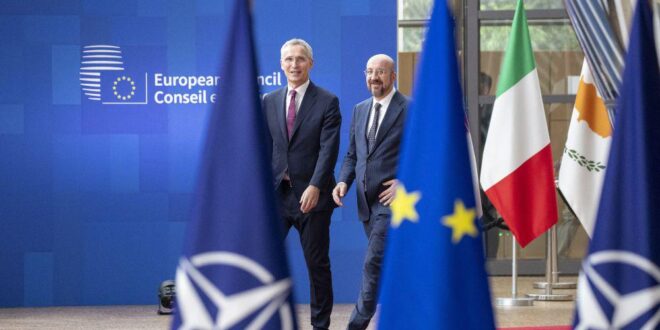The EU has not changed enough in response to Russia’s war on Ukraine. To be effective, the bloc needs a strategic foreign and security policy.*
As the EU institutions wind down for summer vacation, the war in Ukraine continues.
Russia is bombing the port city of Odesa from where so much grain is exported to the rest of the world.
President Vladimir Putin has pulled out of a deal that would give ships transporting the grain safe passage through the Black Sea. Once again, Moscow is using food security as a weapon to put pressure on Europe and the United States to lift some of the sanctions. The hope is that Turkey and the United Nations, the brokers of last year’s grain deal, will step in again to end the latest standoff.
Whatever the outcome, the war taking place in Europe has exposed weaknesses in the EU’s crisis response. The bloc’s foreign, security, and defense policies are still inadequate to deal with conflicts.
The Europeans like to praise their ability to do soft power as opposed to hard power. Their unity in rolling over sanctions against Russia is hailed as an example of the bloc working together, as is their financial, economic, and political support for Ukraine.
But the effect of this soft power is often exaggerated. Look at how, since the war in former Yugoslavia ended in 1999, the EU has been unable to bring viable stability and democracy to the small country of Bosnia and Herzegovina.
Its record in Kosovo is just as miserable. Several EU member states don’t recognize the independence of this country, and Brussels has failed at introducing strong rule-of-law institutions.
Indeed, it’s hard to believe that NATO forces are still in this part of the Western Balkans to maintain some stability as clashes between Serbia and Kosovo, bedeviled by decades of ethnic conflict, periodically erupt.
Without NATO and the support of the United States, the Western Balkans would be far more unstable. And without the strong U.S. political, economic, and military support for Ukraine, the EU would not have achieved the unity it has managed so far in rallying round Ukraine.
Russia’s attack on Ukraine has strengthened NATO to such a degree that EU members Finland and Sweden gave up their neutrality to join the alliance. They did so because of the Russian threat and the need to have security guarantees that NATO offers.
The EU has its own mutual defense clause, but it is toothless: It does not commit the United States, nor in fact all EU countries. Furthermore, the EU’s defense structures are fragmented. There is no single, coherent defense policy to provide the security that the bloc needs given the instability of the continent.
The lack of a defense strategy is Europe’s Achilles’ heel. While it has ambitions to become a global player, which it can achieve up to a point through its trade and competition policies, they are not backed up by any kind of hard power.
French President Emmanuel Macron believes the war in Ukraine does provide a chance for Europe to establish its own defense and security capabilities. He calls it “strategic autonomy.” Despite fears in Poland and the Baltic states that this is about decoupling Europe from NATO, this is not the case. It is about strengthening Europe’s position within NATO and preparing for the day when the United States might weaken its commitment to the military alliance. That day could come if Donald Trump—or a like-minded Republican—is elected U.S. president in November 2024.
The Central Europeans believe that since the EU was founded as a peace project, having a robust defense policy based on hard power is anathema to the union. Russia’s war in Ukraine has made them even stauncher Atlanticists.
Led by Poland, these countries are investing heavily in defense. And with neighboring Finland and Sweden now in NATO, their security is enhanced. This is something the EU has been unable to provide. The union also shows few signs of being able to do it in the future.
In short, the war in Ukraine hasn’t given the EU reason enough to think defense. Nor has it done much to enhance EU foreign policy. The bloc as a whole has had so little to say, let alone act in any way, over the months-long women-led protests in Iran. It has been unable to respond to Israel’s continuing expansion of illegal settlements in the occupied West Bank, its attacks on refugee camps in Jenin, or dealing with the corrupt and undemocratic Palestinian Authority. As for the conflict in Sudan or Tunisia, which is compounding migration problems, the EU can hardly call itself an actor.
It’s hard to see how and when the EU will grasp the need to act strategically. It wasted that time during the Trump administration. Whatever the outcome of the next race to the White House, Europe remains unprepared to make any step toward being able to defend itself. It’s an unpleasant and dangerous reality that the war in Ukraine should and could have changed.
 Eurasia Press & News
Eurasia Press & News



